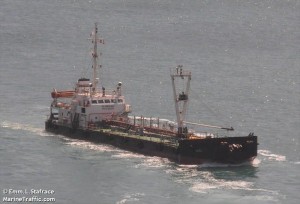By Sami Zaptia.

London, 21 July 2016:
Ali Gatrani, acting in his role as the head of the House of Representatives’ (HoR) Economy Committee rather than as the eastern representative and member of the Presidency Council, has confirmed to the Maltese authorities the illegality of fuel and gasoline exports from Libya to Malta through companies licenced for ”oil services”.
In a HoR headed letter signed by Ali Gatrani dated 17th July and addressed to the Maltese Ambassador, Gatrani clarifies and states that Libyan registered companies whose scope is servicing the oil industry in Libya do not extend to export of oil products from Libya .
These commercial trading licences are legally issued and called ”oil services’’ companies, but are limited to contracting services to the Libyan based oil industry and do not permit the trading and selling of products and Libyan crude or clean products.
He says that companies selling clean or crude out of libya are illigally smuggling Libyan fuel and crude. This is illegal under Libyan law and in accordance with UN resolutions. The smuggling negatively affects the Libyan economy and the income from this is used by smugglers to trade in illicit goods such as the drugs and alcohol trade which affects Libya’s security. The illicit gains can also finance terrorism.
The HoR member highlights the fact that trade in fuel and its byproducts in Libya is subsidized and its trading out of libya is limited by Libyan law exclusively to the National Oil Corporation (NOC).
He calls upon the Maltese authorities not to accept any Libyan documentation presented by smugglers suggesting that their smuggling transactions are a legal trade: As they are not and any such claim is a misrepresentation.
This latest letter from Gatrani seems to have been issued as a result of the misuse of an earlier letter issued by Gatrani dated 23rd November 2015 earlier supports the activities of a Libyan ‘‘oil services’’ company which seems to have been misused to justify the illegal smuggling of fuel to Malta.
Gatrani is confirming the fact that only the NOC has the right to trade in fuel and that Libyan oil services companies can provide a host of other services permitted by law – but excluding the trade in fuel. Subsidized fuel is intended for domestic Libyan consumers and not for export outside of Libya.
It will be recalled that during his June 2014 visit to Malta, the then internationally recognized Libyan Prime Minister Abdullah Thinni called upon the Maltese government to take action against those involved in smuggling fuel from Libya to Malta.
He said that the smuggling was on the increase and had become “a threat to the Libyan state” which could impact not only on national security but on the close ties between the two countries. He had accused smugglers of taking advantage of Libya’s security crisis.
Malta’s Foreign Ministry had responded by saying that senior Maltese security personnel had met to investigate Thinni’s allegations and take action. Adding that Malta would cooperate with Libya to fight smuggling in all its forms. Information from Libya would result in “immediate action” by the Maltese, Maltese Foreign Minister Vella had said.
In 2013, in two separate incidents, two Maltese men, Matthew Piscopo and Kevin McManus were arrested in Libya on suspicion of smuggling thousands of litres of Libyan diesel to Malta.
In January 2015 the five crew of a Maltese-managed coastal tanker were detained on suspicion of fuel smuggling in Tripoli.
The men were arrested when their Moldovan-flagged vessel , the 5- metre tanker, the Sun Oil was towed to Tripoli by an unnamed Italian freighter which had reportedly found the tanker drifting without power in Libyan waters. The vessel was reportedly loaded with petrol.
The smuggling of highly-subsidised Libyan fuel to neighbouring states, including Malta, has long been a major source of income to some militias and criminal gangs, contributing to extremism, terrorism, instability and insecurity.







